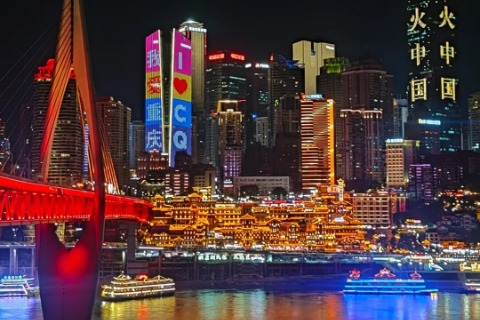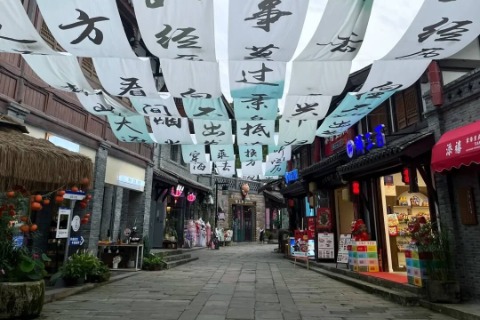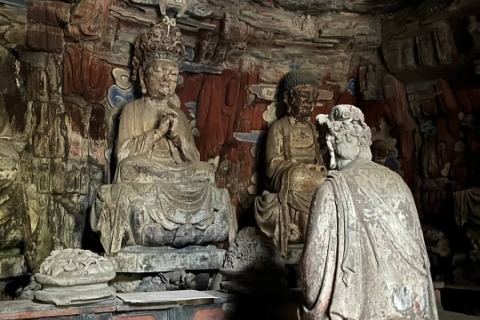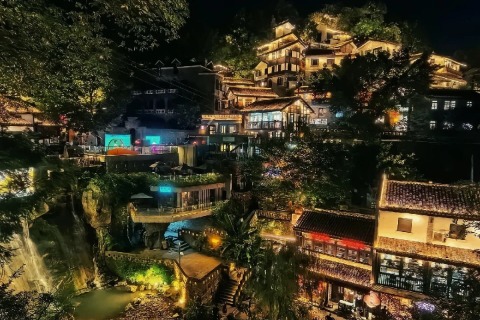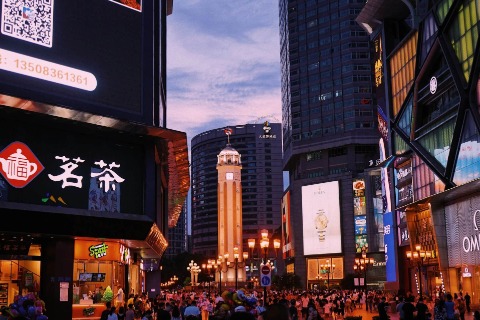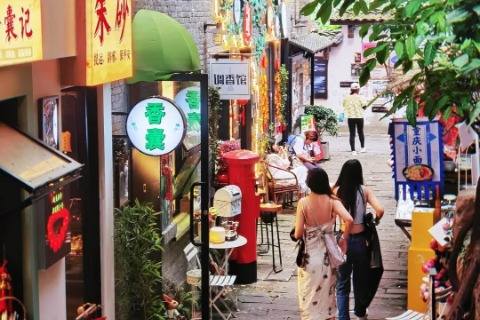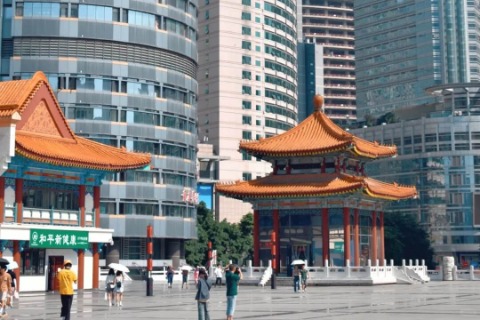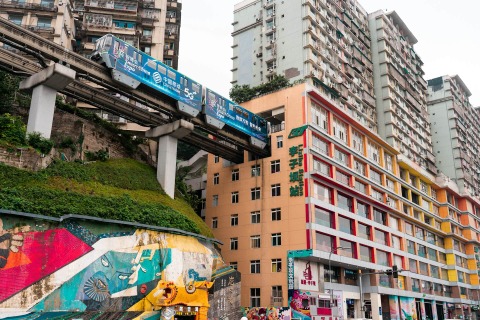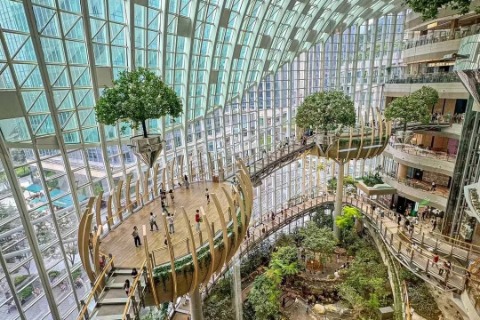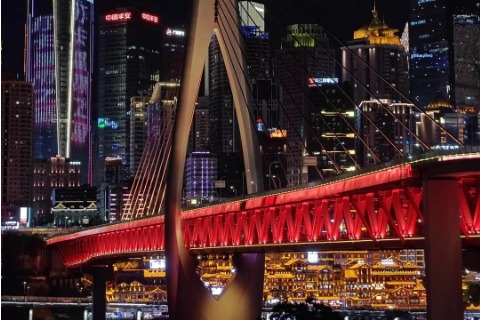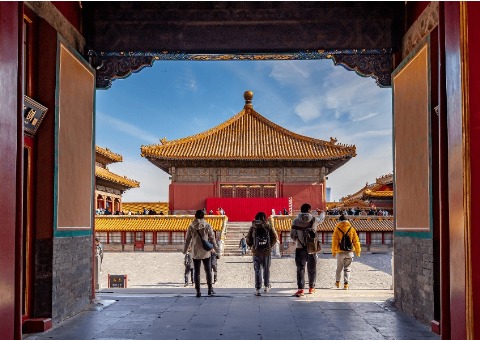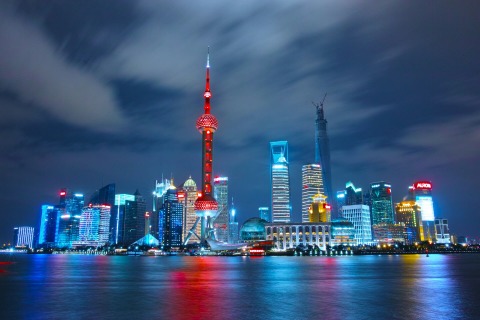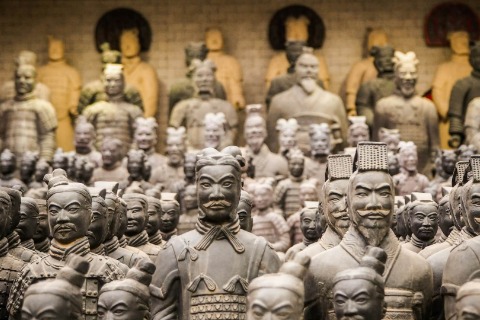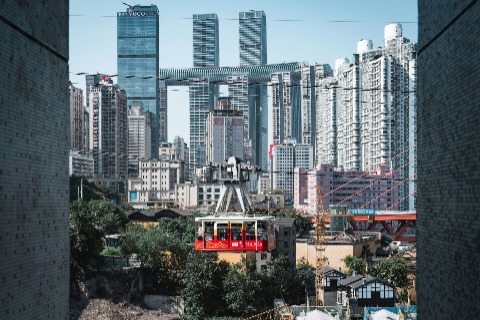Mountain City Trail
If you visit just one street in Chongqing, don’t miss the Mountain City Trail!
Chongqing’s Mountain City Trail is one of the city’s most unique paths, stretching 1,748 meters. Visitors can experience the distinct stair-like slopes, known as “ti kǎn,” which offer a unique uphill journey. The trail features many cultural sites, especially remnants from Chongqing’s role as the Allied command center in the Far East during World War II, providing insight into the city’s history.
Additionally, there’s an elevated walkway along the path, offering stunning views of the Yangtze River and the ancient city wall that’s over 2,000 years old. The recent renovations have made the trail clean and tidy, with lanterns added along the sides, enhancing the festive atmosphere. At night, visitors can enjoy breathtaking views of the city lights, experiencing a different side of Chongqing. The area still retains its authentic charm, allowing guests to appreciate the rich local culture.
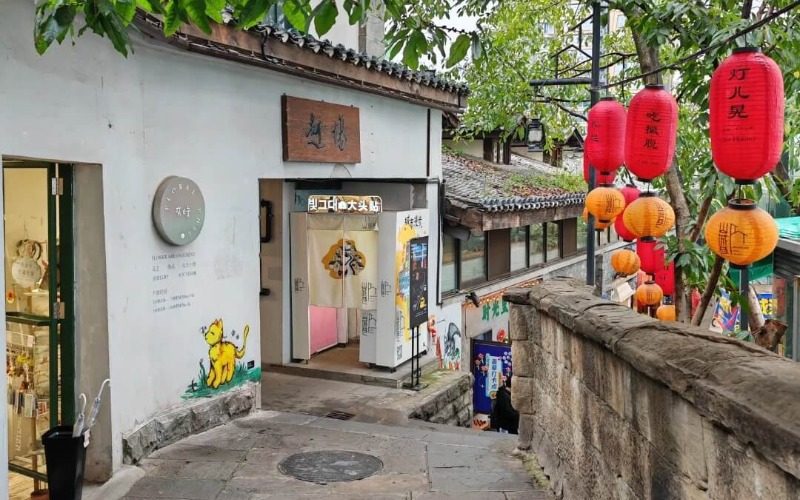
Table of Contents
Highlights of the Mountain City Trail
Ren'ai Hall (Chinese name: 仁爱堂)
Ren’ai Hall is the first Western hospital built by the French in Chongqing. This complex was originally constructed by the French Catholic Church along the river and includes landmarks like a church, hospital, and school, with the hospital being the most famous. Although some structures have crumbled over time, their glorious past still attracts visitors who stop to take photos and reflect. This building is not only a testament to Chongqing’s history and culture but also an important symbol of cultural exchange between China and the West.
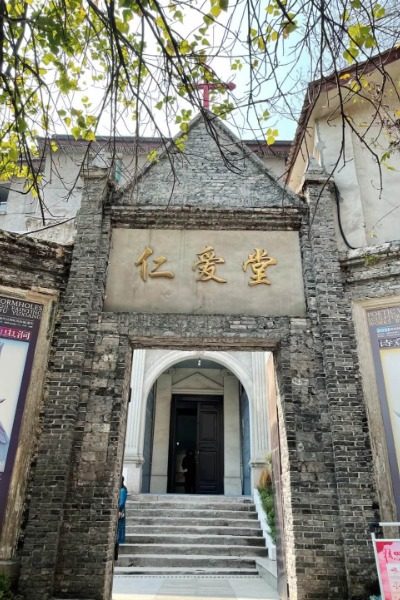
Outdoor Tea Houses (露天坝坝茶馆)
Chongqing’s outdoor tea houses are a unique cultural phenomenon. They are not just places to drink tea; they represent a lifestyle. Typically set outdoors, these tea houses offer a space that connects people with nature, allowing them to enjoy fresh air and beautiful surroundings while sipping tea. These spots often become gathering places for writers, poets, and other cultural figures, creating a distinct cultural atmosphere.
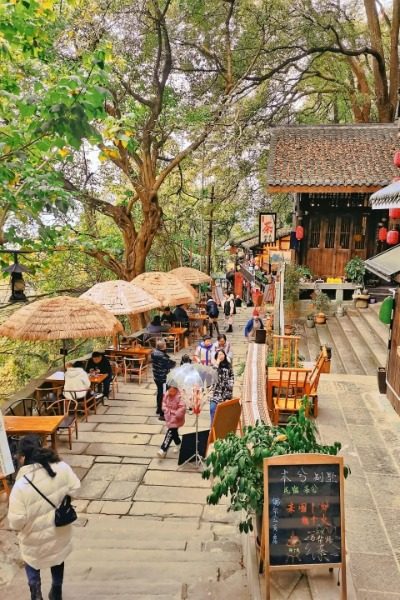
Air Raid Shelters (防空洞)
Chongqing’s air raid shelters bear witness to the history of the War of Resistance Against Japan. Some, like the “War Production Cave,” were built during this period as munitions factories to preserve resources and support production activities. These shelters housed many citizens and contributed to the war effort. Over time, some have been transformed into modern facilities such as hot pot restaurants, bookstores, markets, gas stations, parking lots, and museums, becoming an integral part of urban life.
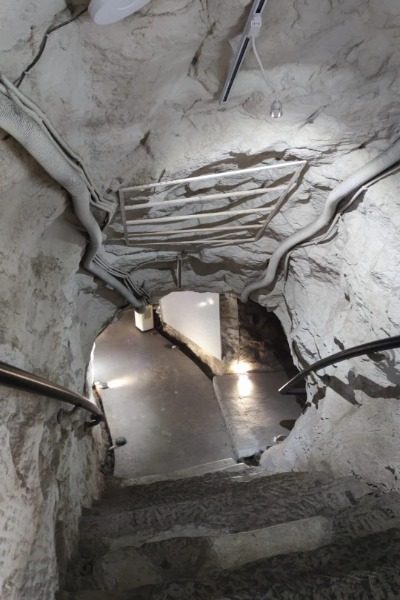
Iron Cake Stalls (熨斗糕摊点)
Iron cakes are beloved by Chongqing locals for their crispy exterior and soft, sweet interior. Made from ingredients like rice flour, eggs, and sugar, they are baked until golden and slightly crunchy, creating a warm, comforting treat. Some stalls along the Mountain City Path have been operating for 23 years, attracting many repeat customers.
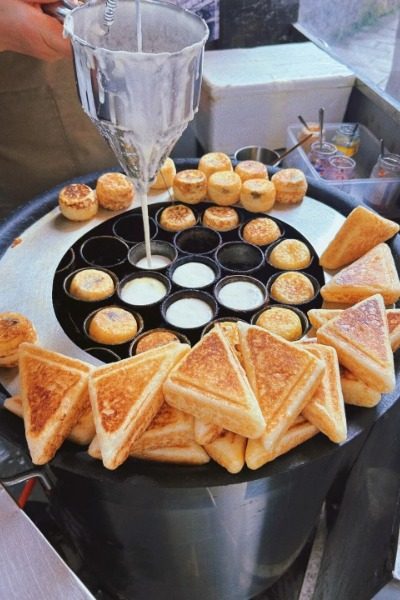
Cliffside Walkway (悬崖栈道)
The cliffside walkway along the Chongqing Mountain City Trail is the only urban path built on a cliff in Chongqing. On one side, it overlooks the sheer drop of the cliff, while the other is adjacent to a 2,300-year-old ancient city wall. Visitors can enjoy breathtaking views of the Yangtze River and its surroundings from the railing.
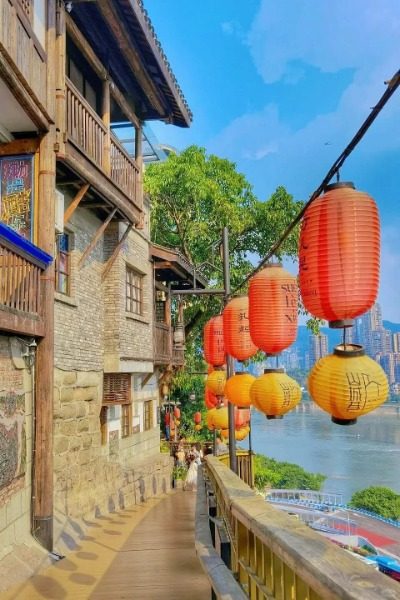
Tongyuan Gate and City Wall Ruins (通远门城门及城墙遗址)
Tongyuan Gate and the city wall ruins are the only well-preserved sections of the ancient wall in Chongqing. They were originally built in the late Southern Song Dynasty and reconstructed during the Hongwu period of the Ming Dynasty.
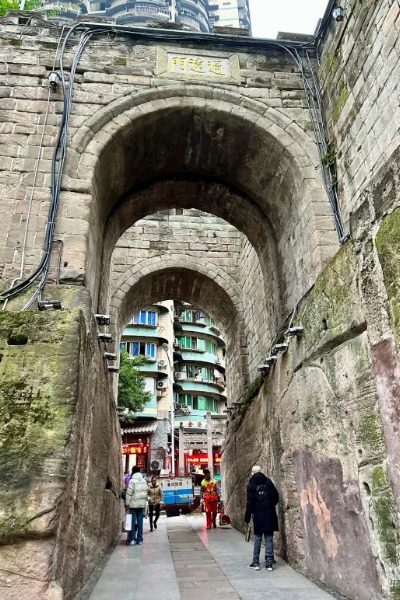
Mountain City Time Library (山城时光里图书馆)
This library is not just a place for reading; it also incorporates the unique culture and flavors of Chongqing. In addition to its extensive collection, Mountain City Time Library offers local snacks like fish skin peanuts, eagle tea, and spicy sour noodles, allowing visitors to savor authentic Chongqing tastes while they read.
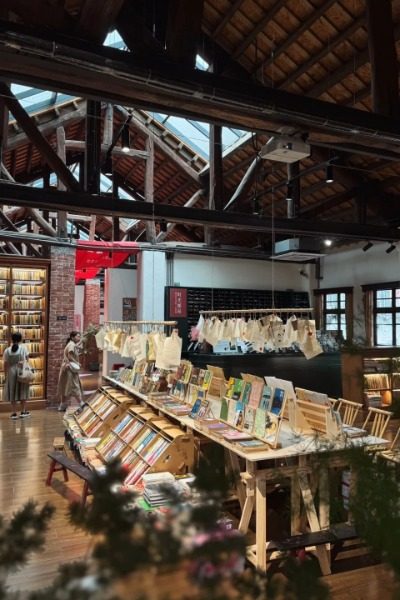
Consulate Alley (领事巷)
Once home to multiple foreign consulates, Consulate Alley buzzed with diplomats and blends Western architecture with Eastern charm, creating a unique scenic area. The site of the former British embassy remains, its grand style still impressive despite the passage of time. Nearby, the food scene is diverse, featuring vibrant hot pot with rich, fragrant beef tallow and fresh ingredients dancing in boiling water, along with crispy fried meat that’s tender inside, and translucent cold noodles infused with spicy flavors.
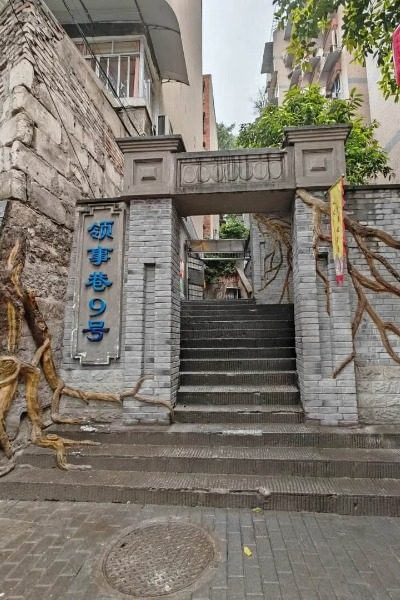
Practical Travel Tips
- Exploring the Mountain City Trail takes about two hours. There are many stairs, so it’s best to travel light and wear comfortable shoes.
- If you prefer a more relaxed walk, take the subway to Qixinggang Station, then grab a taxi to Consulate Alley. Starting from there is downhill, making it easier.
Hours and Fees
Hours
- Open all day.
Admission
- No admission fee required.
How to Get to the Mountain City Trail
By Bus
- Take bus routes 301, 308, 321, 322, 346, 361, or 429. You can get off at Zhongxing Road Station(中兴路站), and it’s a short walk to the Mountain City Trail.
By Subway
- Take Line 1 of the subway and exit at Qixinggang Station(七星岗站), Exit 1. After exiting, turn right and walk straight to reach Tongyuan Gate. After passing through the gate tower, turn right and walk about 300 meters to enter the Mountain City Trail.
How Visitors Rate the Mountain City Trail
International tourists
Local tourists from China
If you only have time to visit one street in Chongqing, don’t miss the Mountain City Trail! I recommend starting from Consulate Alley, which is all downhill. Take Line 1 to Qixinggang Station, Exit 1, and then navigate to "Consulate Alley." It’s about a 10-minute walk. Once you enter, just stroll down the path—it's super easy and enjoyable, and you can explore the whole trail without getting tired!

